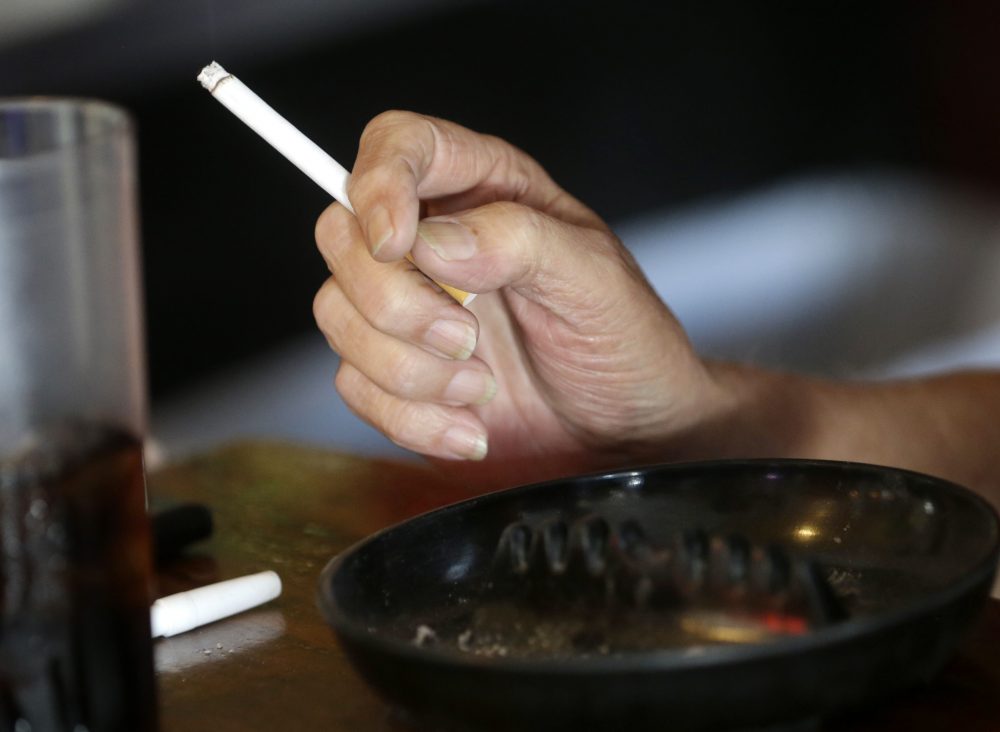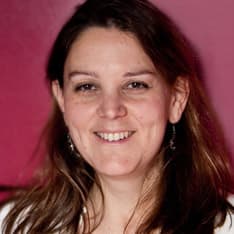Advertisement
The Latest Thinking On How To Prevent Cancer, From Smoking And Diet To Sleep
Resume
This story is part of our "This Moment In Cancer" series.
Cancer seems to strike so randomly that the idea that we might have any control over it may seem foolish.
Certainly, no one can entirely protect themselves against the disease. But it's increasingly clear that lifestyle factors can have a major impact on cancer risk -- affecting most cancers, experts say.
If smoking and obesity can be reduced, "We are going to see decreases in cancer mortality, at least over the next decade or two, that dwarf anything I and my colleagues can produce in terms of new, miraculous cures,” says professor Bob Weinberg, a biologist at MIT and the Whitehead Institute who has spent a lifetime devoted to seeking cancer cures.
“Without any doubt, the greatest decreases in cancer-associated mortality will come from preventing the disease rather than trying to treat it, as I try to do,” he says. “Thus, a conservative person would say between 50 and 60 percent of cancer deaths are preventable today. Not by the development of new drugs, but by stopping smoking, by retaining a reasonably lean figure.”
Smoking
Smoking rates are down nationwide, but cigarettes still play a role in about 40 percent of all cancers, according to a CDC report from November. Enough said.
Diet
Next up, unfortunately for many of us, is obesity, which has been implicated in more and more cancers as Americans have gotten larger and larger.
Diet and nutrition studies are notoriously difficult to conduct, so researchers can’t say with any certainty whether a weight gain of a particular amount at a specific time will increase cancer risk.
But large population-based studies like the Nurses Health Study have suggested that overall, people who are heavier are at higher risk for more than a dozen cancer types.
It’s also difficult to tie specific foods to cancer risk, but researchers believe that eating lots of fruits and vegetables, whole grains and olive oil -- the classic Mediterranean diet-- is healthier than a high-fat and highly processed American one. Red meat -- particularly processed red meat like cold cuts and, unfortunately, bacon -- may pose extra cancer risk.
That doesn’t mean you have to go cold turkey on meat, researchers say, but generally eating less is healthier than eating more.
“The more processed meat, the more red meat you take, potentially the higher your risk,” says Dr. Andrew Chan, a gastroenterologist and oncologist at Massachusetts General Hospital. “We do think that modest portions of meat are probably fine.”
In general, no food needs to be completely eliminated, as long as you eat it in moderation, says Dr. Jennifer Ligibel, a senior physician at Dana-Farber Cancer Institute.
“Personally, I don’t think there’s enough evidence to say that any particular food should never be consumed,” she says. But evidence does suggest that diets that are good for the heart, like the Mediterranean diet, are also good for moderating cancer risk.
People who lose large amounts of weight through bariatric surgery are at significantly lower risk of cancer, which suggests that “the weight itself is directly linked to the risk of developing many cancers,” says Ligibel, whose own research focuses on lifestyle changes to prevent breast cancer and breast cancer recurrence.
Ligibel says it’s not completely clear why excess weight increases cancer risk, but it may be because the extra pounds can trigger damaging inflammation. “We know that excess weight impacts not only inflammation but also metabolism and the immune system,” she says.
Exercise
Exercise likely makes a difference too. In breast cancer, research suggests that physically active people are at 20 percent lower risk for developing the disease than inactive people; in colorectal cancer, there’s a 30 to 40 percent lower risk.
You don’t have to run marathons to get a benefit, though. Ligibel says a 30-minute brisk walk every day, or 150 minutes per week, has been linked to lower cancer risk.
For women, the benefits of this kind of exercise appear to be present even after menopause, she says, and exercise seems to be effective even at reducing the risk of aggressive, hormone-independent breast cancers, which remain the hardest to treat.
“It’s never too late to start,” she says.
And if you carry a few extra pounds, getting exercise is probably just as important for you as for people who are slim, she says.
“Anything you’re able to do is better than nothing,” Ligibel says. “Even if you’re not losing a lot of weight through your exercise, we do have evidence to suggest that [getting exercise and eating a healthy diet] are still beneficial.”
Sleep
Getting enough sleep also impacts cancer risk. Although researchers are still trying to understand the connection between sleep deprivation, the body clock, and cancer, there’s evidence of a link.
“It is becoming increasingly clear that sleep deficiency and disruption of the circadian clock increase the risk of a variety of different types of cancer,” says Dr. Charles Czeisler, a sleep expert at Brigham and Women’s Hospital.
People who work the night shift long-term are at higher risk of developing cancer, studies suggest. And people who are chronically sleep-deprived also seem to carry a higher risk of cancer, he says.
It’s not yet clear why, though the sleep-promoting hormone melatonin seems to play a key role, Czeisler says.
“It would appear that melatonin helps to keep cancer at bay, and light suppresses the release of melatonin,” he says. “If we stay up all night, either working on our screens or just having fun, our exposure to light during the night is going to suppress the release of that hormone.”
Women who are totally blind have half the breast cancer risk of those who are visually impaired but can still see some light, Czeisler says. His research has found that Icelandic men who are chronically sleep-deprived are four times more likely to develop advanced prostate cancer than men who sleep well. And animal research has shown that tumors grow faster in animals with disrupted sleep, he says.
Alcohol
Another lifestyle change you can make to reduce your cancer risk — and again, this probably isn't a surprise — is to avoid drinking too much.
Although up to one drink a day for women and two for men has been associated with healthy living, more than that can boost cancer risk, Ligibel says. People who smoke and drink are at even higher risk, because of what appears to be a synergistic effect, she says.
Vitamins
The American Cancer Society, among others, recommends against using supplements to prevent cancer. Earlier studies of vitamins like E and selenium found that they actually increased risk of cancer rather than preventing it. There is some interest now in vitamin D. But it’s safest to get that from sunlight and diet.
Medications
While most cancers are a combination of lifestyle and environment, cervical cancer and some head and neck cancers have been linked to the contagious human papilloma virus, or HPV. Young adolescents are generally encouraged to get vaccinated against HPV to prevent these types of cancers.
Since most cancers are not caused by infectious agents, it’s unlikely that we’ll be able to prevent a lot more cancers with vaccines, experts say, though some researchers are developing vaccines to help people who already have cancer better fight off the disease.
Breast cancer treatment drugs like tamoxifen and the newer estrogen-lowering drugs called aromatase inhibitors have been found to cut in half the risk of hormonally-driven breast cancers in women with an increased risk of developing breast cancer and in women over 60. But because the drugs have side effects, they are mainly taken by those at particularly high risk for breast cancer, Ligibel says.
Chan, at MGH, says he's increasingly convinced that aspirin can help reduce the risk of several types of cancer.
“There’s definitely very strong evidence that people who take aspirin have a 30 to 40 percent lower risk of developing colorectal cancer,” and perhaps other cancers, says Chan, a leading researcher in this area.
The research is still too preliminary to suggest that everyone should be taking aspirin to reduce their cancer risk — aspirin carries its own risks, and people should talk to their doctor before beginning any new medication, Chan notes. But people who are already taking a baby aspirin a day to help prevent heart disease may also see an extra benefit in cancer risk reduction.
Mental Attitude
There isn’t much solid data about attitude and cancer, other than an emphatic statement from experts that people should not blame themselves if they get cancer.
But your mental state might have some effect. Just last week a study in the British Medical Journal found that people who reported high levels of anxiety or depression were more likely to die of cancer than people who did not suffer this kind of distress.
This doesn’t prove cause-and-effect, but it does hint that the immune system might not fight off cancer as well in someone who is under this kind of stress.
Chan says it’s clear that mental and physical health are linked; people who are depressed are less likely to take good care of their health, for instance. But the connection to cancer still needs more research.
Understanding the biological pathways that are common to psychological stress and cancer might offer new treatment possibilities, he says. “There is definitely some overlap between some of the things we think of as being clearly psychological issues and some that clearly have a biological basis for disease, such as cancer,” he says.
The bottom line, Chan and other experts say, is that most of the same things we all know we're supposed to do to be healthy also help prevent cancer. Although you may feel like you have no control over cancer, your actions can make a significant difference, regardless of the genetic hand you’ve been dealt.
"Anything you can do to modify your behavior and do what you can to maintain a healthy lifestyle, I think will be value added down the line,” Chan says.
This segment aired on February 3, 2017.

